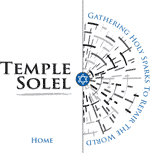On the surface, this week's Torah portion (Parshat Tazria) is fixated on everybody else. What are the people around us doing? Do we see anything out of ordinary? Does anyone look strange?
The Torah is especially concerned about that last question - because our text this week revolves around the question of tza'ra'at - a mysterious leprosy-like skin disease that was common in ancient times. According to this week's Torah portion: the disease was dangerous! Community members had to be constantly monitoring each other in order to identify an outbreak as soon as possible.
On one level, the sense of danger was connected to the community's physical vulnerability. The disease was easily spreadable. In order to protect the community, those afflicted with the disease had to be isolated, so as to insure that others couldn't get sick.
But our rabbis have never read these passages as being limited to communicable disease. According to their worldview, the illness was a physical manifestation of a more serious phenomenon: Divine punishment from God for a moral lapse. (And not just any lapse. The rabbis zoomed in on the Hebrew word for 'one who is afflicted with tza'ra'at': metzorah. They read metzorah as code for one who gossips.)
Obviously, our tradition is strongly opposed to gossip, slander, and libel - in all of their insidious forms. You can click here for a number of different Jewish resources if you are interested in learning more about the Jewish position on gossip.
What I am most fascinated by, however, is not the Jewish prohibition about gossip itself...but rather this notion that the Torah seems to be encouraging us to police each other about it. If someone in the community notices an outbreak of tza'ra'at - other people are supposed to report it immediately. For the rabbis of the Talmud (who insisted that a person with tza'ra'at was a gossip), that meant that they were basically codifying the Jewish obligation to be a tattletale. (Like children, we are supposed to report to the teacher if a peer of our's has been gossiping!)
There is a story about Rabbi Israel Salanter, founder of the 19th century Musar movement, which offers us a different perspective:
- In 1848 there was a cholera epidemic in Vilna. As usual in times of calamity, the Jews began to examine what sins of theirs might have brought this about. One person came to Rabbi Israel Salanter and told him that a certain person was violating the Torah. Rabbi Israel said to him: “A person with tza’ra’at was sent outside of the camp in the desert, because, as our Sages tell us, tza’ra’at is caused by the slandering of others. But the sin of slander does not consist of spreading lies about others. Rather it is caused by seeking the faults in others, rather than in oneself. Thus the one who slanders is told: if you are so good at finding fault, go out of the camp, remain isolated by yourself, and search for your own faults and sins. Thus Rabbi Salanter taught: The reason a person who finds fault with others is committing a sin is because he should have used that time to find fault in himself.
According to Salanter, and the movement of Musar that he helped to establish, we should avoid the usual human pitfall of judging others. Instead, we should be using that time and energy to look into the mirror and identify shortcomings in ourselves...in an attempt to begin a process of ethical improvement of the self.
Musar is a formal method of studying ethical texts in our tradition, as well as implementing a process of self reflection which enables us to become more aware of the ethical decisions that we are all constantly making. Musar provides a framework for evaluating those decisions, and then empowering us to make better ones in the future. To learn more about that approach you might consider reading Alan Morinis' "Everyday Holiness: The Jewish Spiritual Path of Mussar". If you just want to become more familiar with the ethical texts and traditions of Judaism, you might read "The Jewish Moral Virtues" by Borowitz and Schwartz.
But you don't have to be formally "doing Musar" to get connected with these values. All you have to do is teach yourself to be a little more self aware and self reflective. Consider using a journal, and just begin to keep track of the things you do, and how they make you feel. If your conscience indicates that you might have just made an error, write about it. Over time, your journal will become a baseline for you to return to - to become better acquainted with who are now. Ideally, your journal can become like a mirror: enabling you to see yourself in new ways: some that you're proud of - and others that you'll be motivated to change and improve. (If the idea of a journal doesn't sit well with you, consider beginning/continuing a relationship with a counselor, therapist, or trusted mentor. Sometimes it takes another person to help us see who we are/how we are behaving. They too can motivate us to become better people.) That's what Musar is all about.
Wishing you a Shabbat - and a lifetime - of self reflection,
Rabbi Brown






No comments:
Post a Comment